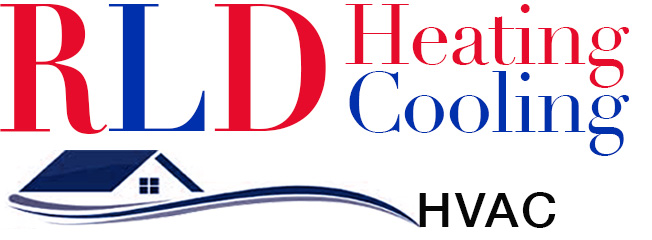Heat Pump vs. Furnace in Los Angeles– The one that suits you better!
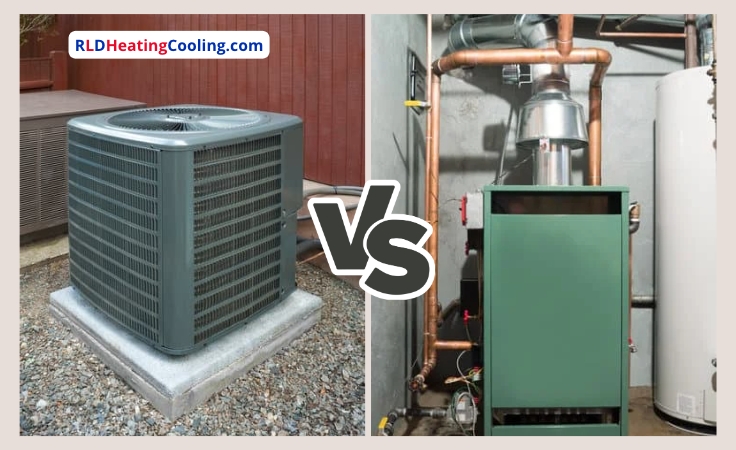
Choosing between a furnace and vs. heat pump can be a challenging task, especially for homeowners considering heating installation for an upcoming winter season.
After all, both these systems are equally efficient and provide energy-efficient heating.
However, the way they carry out their heating process is entirely different, and some situations and conditions may be better suited for heat pumps. In contrast, others are better suited for furnaces.
Homeowners sometimes find it challenging to decide between the two systems. So, if you’re one of them, this blog is for you.
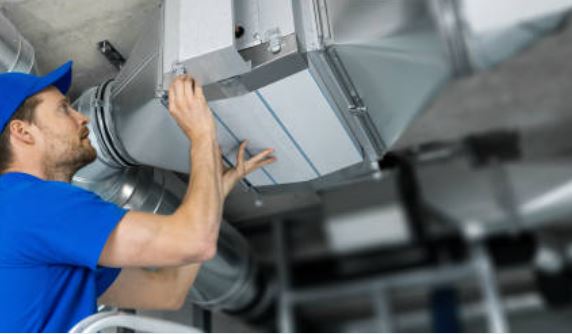
call 818-210-6669
Contact us 24/7 for your HVAC needs
In this blog, we will discuss the following:
- The functionality
- Key differences.
- Pros & cons and more.
So it’s easy to decide on a system best suited for your house.
Heat Pump
A heat pump is an electric appliance that provides heating and cooling by moving heated air from one place to another.
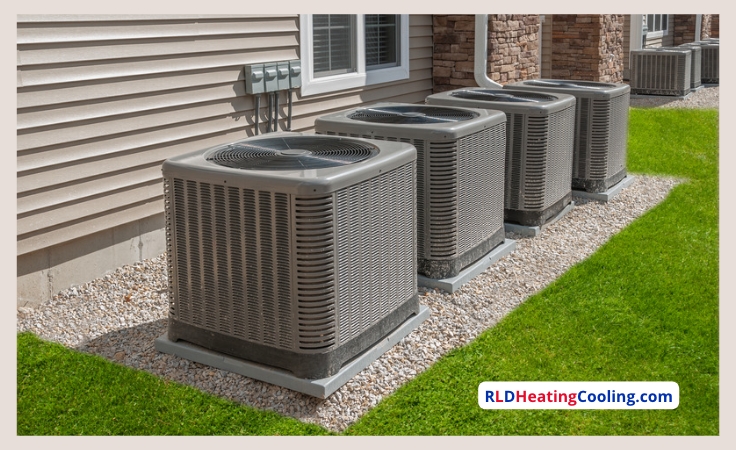
They can be used as air conditioners and heating systems.
These systems absorb heat from the outside environment and transfer it to a liquid refrigerant.
The system then pumps the refrigerant to a coil or heat exchanger inside your home’s ductwork.
The air then blows across the coil and heats up, after which it is distributed across your house.
As surprising as it sounds, these systems only partially rely on outside heat to warm your house.
So, these systems can even work in frigid temperatures, even though they are less efficient.
You can also easily use these systems during summer to cool your house as they remove heat from inside your house. (1)
Since these systems work in both modes, they require frequent heating repair services.
Furnace
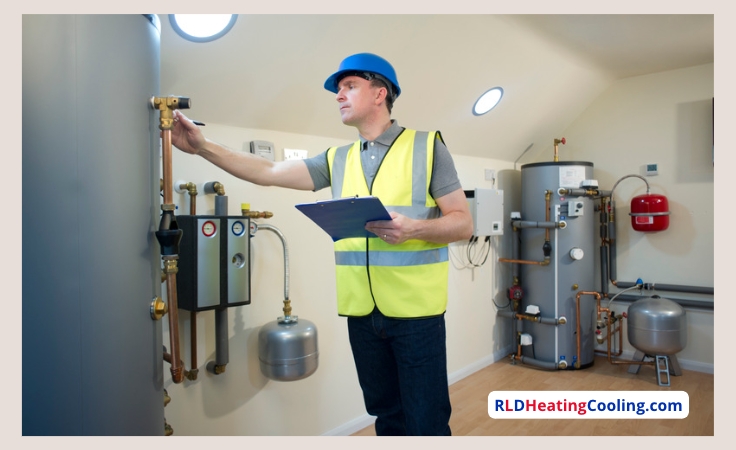
Your house furnace is a forced-air heating system connected to your house’s ductwork. These systems use oil, fuel, propane, natural gas or electricity to heat a burner. The heat from the burner is then transferred to a heat exchanger. A large fan blows across the heat exchanger, which creates heated air. The heated air is then distributed throughout your home to heat every room. (2)
Heat Pump vs. Furnace: Key Differences
While the primary purpose of both systems is similar, and each uses similar components, these systems have some significant differences. Here are some key points to consider when comparing furnaces to heat pumps.
Heat Pump vs. Furnace Difference #1: Cost
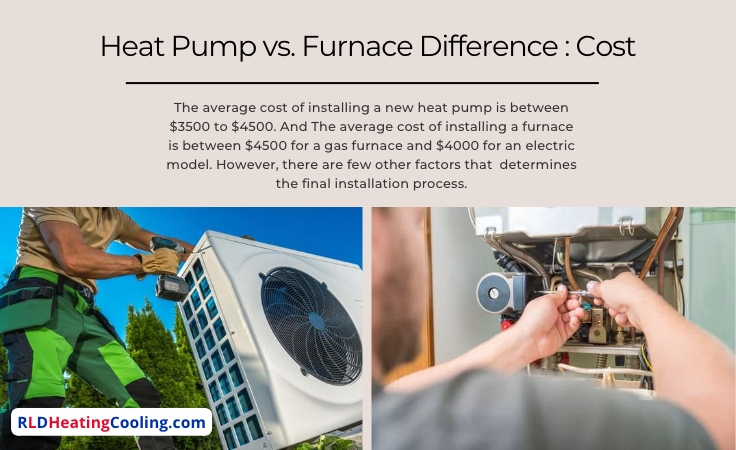
Heat pumps: The average cost of installing a new heat pump is between $3500 to $4500. However, many factors determine whether the ductwork already exists, the complexity and size of the system and the type of heat pump.
- Air-to-air heat pumps extract heat from the surrounding air. These systems are the least complicated and cheapest models, but their efficiency drops in cold climates.
- Geothermal heat pumps absorb heat from under the earth through underground pipes, taking advantage of the constant 50-degree temperature below the earth’s surface.
Furnace: The average cost of installing
The average cost of installing a furnace is between $ 4,500 for a gas furnace and $ 4,000 for an electric model. Natural gas is way more efficient than electricity. However, many processes can involve running gas lines into a house. This step alone can be cost leveling, making the electric furnace an attractive option. So, you only need a qualified furnace technician to carry out the installation process.
Also Compare: Oil vs Gas furnace
Heat Pump vs. Furnace Difference #2: Efficiency
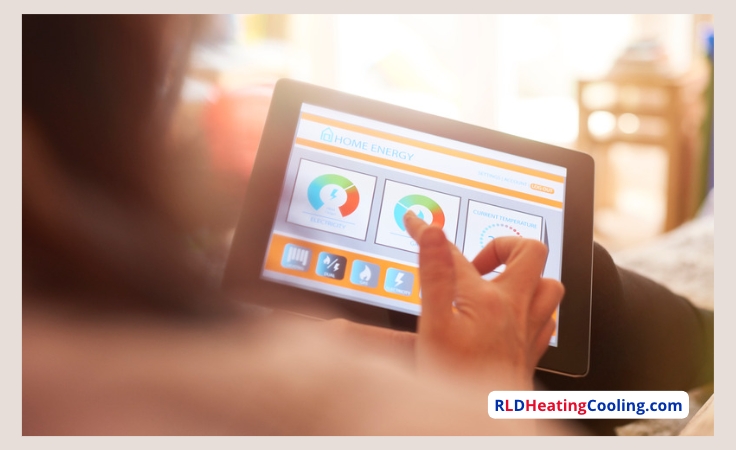
Heat Pump: Heat pumps, though operating on electricity, use a minimal amount to transfer heat from one space to another. It makes the system very energy efficient. However, the heat pump efficiency drops with the drop in temperature levels. In frigid winters, these systems must work extra hard to keep your house warm. It makes them less or even insufficient compared to furnaces.
Furnace: Furnace heating uses energy sources to generate its heat. It may be propane, oil, natural gas or electricity. When comparing all these fuels, natural gas is the most efficient. However, it is less efficient than heat pumps at average temperatures. However, during cold temperatures, heat pumps cannot compete with furnaces.
Also compare: Heat pump vs oil furnace
Heat Pump vs. Furnace Difference #3: Durability
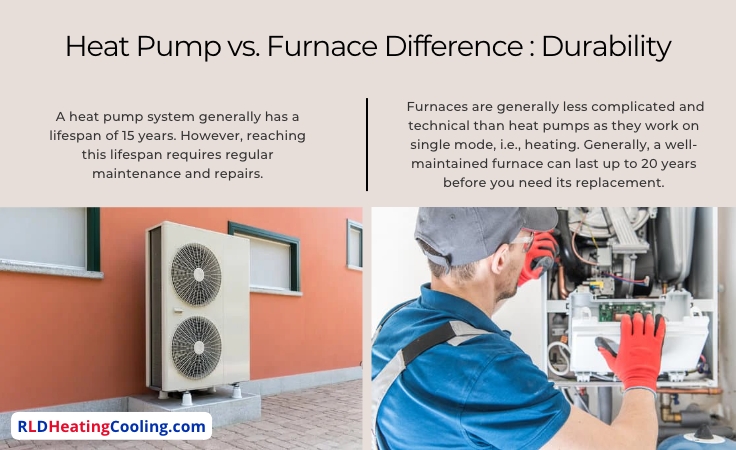
Heat pump: A heat pump system generally has a lifespan of 15 years. However, reaching this lifespan requires regular maintenance and repairs. The pumps, refrigerants and other components of heat pump replacement.
Furnace: Furnaces are generally less complicated and technical than heat pumps as they work on a single mode, i.e., heating. Typically, a well-maintained furnace can last up to 20 years before needing replacement.
Also read: Heat pump vs. gas furnace.
Heat Pump vs. Furnace Difference #4: DIY ability
Heat pump: Some heat pumps are DIY friendly. While these systems contain refrigerants and working with them typically requires specific licenses, some kits are available on the market that are easy to use. So the homeowners can install it themselves. These systems are generally available in the form of mini-split units. Mini-splits are air conditioning units that include built-in heat pumps, which are mounted on the walls within the rooms rather than requiring ductwork connections.
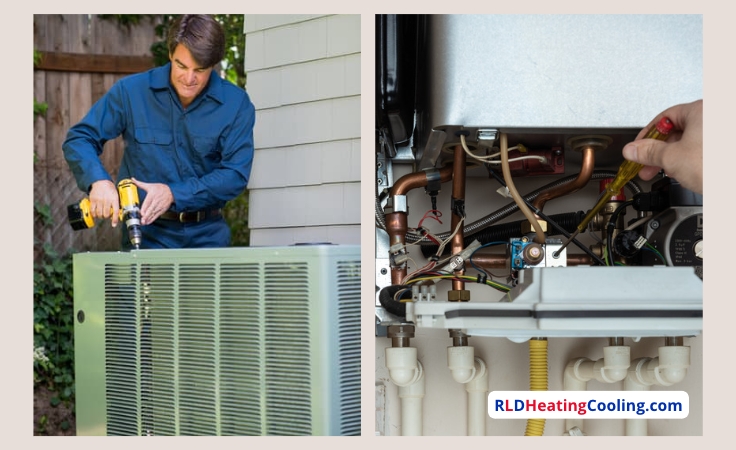
Furnace: Furnace installation is best left to the professionals at HVAC companies near you. Ensuring a continuous fuel supply and that the system is installed correctly requires expertise. So it is better to leave it to an expert.
Heat Pump vs. Furnace Difference #5: Maintenance
Heat pump: Heat pump maintenance is a more challenging task than furnace maintenance, but you can try your hand at it. Here are some tips for homeowners:
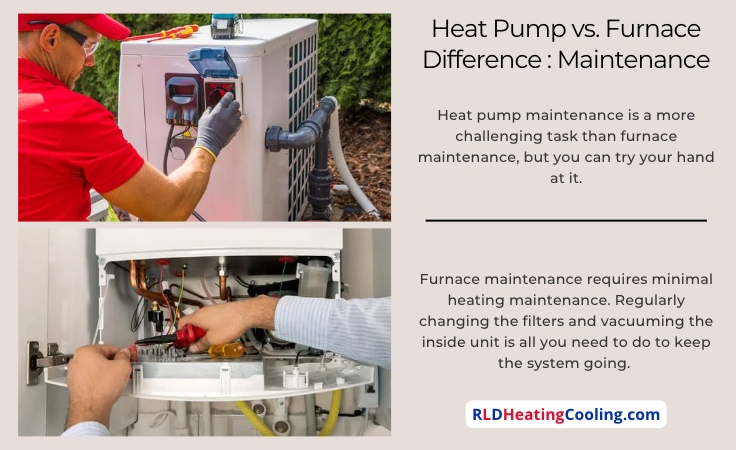
- Keep the pumps clear of any ice or snow in the winter.
- Remove leaves, plants, and debris that accumulate around the system to ensure smooth airflow.
- Change the air filters at least once a month.
- Clean the coils regularly.
Carrying out these tasks will ensure that the heat pump lasts long and runs efficiently.
Furnace: Furnace maintenance requires minimal heating maintenance. Regularly changing the filters and vacuuming the inside unit are all you need to do to keep the system running smoothly. Cleaning the flame sensor with sandpaper before the heating season is also a great way to enhance the system’s efficiency.
Also check out: Heat pump vs electric furnace
Heat Pump vs. Furnace Difference #6: Appearance
Heat pump: Though efficient and versatile, heat pumps could be more visually appealing. These units typically require a large, standalone unit to be placed outside your house. Additionally, mini split units feature large machines that must be hung on the wall, which can sometimes compromise the aesthetics of your home.
Furnace: Unlike heat pumps, furnaces are typically located out of sight. They are usually installed in attics, basements and utility rooms. It makes them completely out of sight. It can be a significant factor for folks with small yards who like to keep them clean and organized.
Pros and Cons of Heat Pumps
Let’s start with the good and the bad sides of heat pumps:
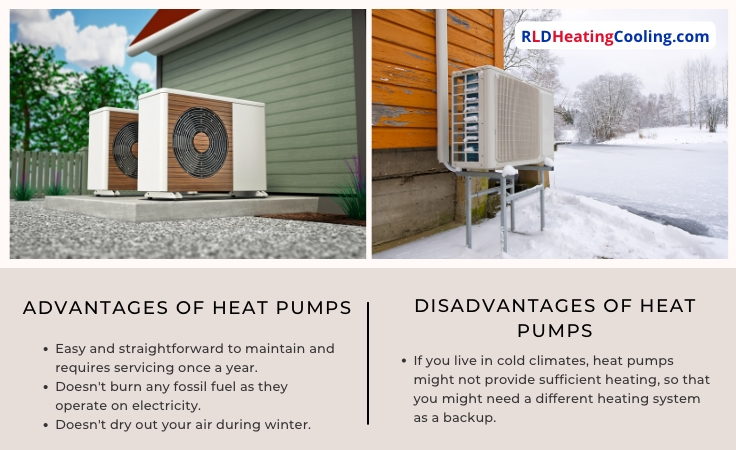
Advantages of heat pumps
Here are some of the advantages of heat pumps:
- Heat pumps are versatile and can replace all your existing heat pump vs. HVAC technologies.
- Easy and straightforward to maintain, and requires servicing once a year.
- Heat pumps are also eligible for state and federal home improvement rebates.
- Noise-free.
- They don’t burn any fossil fuel as they operate on electricity.
- Doesn’t dry out your air during winter.
- Heat pumps don’t require ductwork, which can save you a lot of installation costs.
- Mini-split heat pumps also provide temperature control from room to room.
Disadvantages of heat pumps
Despite the numerous advantages, heat pumps do have two significant drawbacks:
- If you live in cold climates, heat pumps might not provide sufficient heating, so you might need a different heating system as a backup.
- The upfront installation cost of a heat pump is more than that of traditional heating equipment and is much more expensive than a furnace.
Pros and Cons of a Furnace
Some pros and cons of a furnace heating system are:
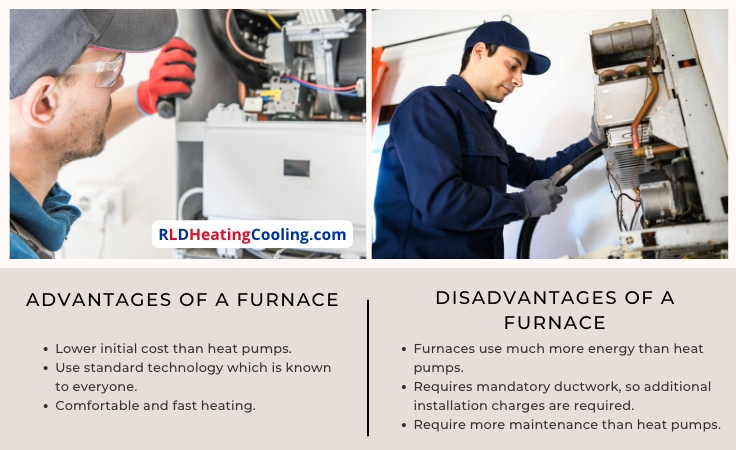
Advantages of a furnace
- Lower initial cost than heat pumps.
- Use standard technology that is widely recognized.
- Comfortable and fast heating.
- Furnaces are available in multiple fuel systems, including electricity, oil, propane, and natural gas.
Disadvantages of a furnace
However, heat furnaces also have some significant drawbacks. Here are a few to consider:
- Furnaces use much more energy than heat pumps.
- Requires mandatory ductwork, so additional installation charges are required.
- The system generates noise and occasionally emits a distinct burning smell when in operation.
- Require more maintenance than heat pumps.
- Lifespan is short for a heat pump.
- The furnace can only heat your house, while a heat pump can do both.
- It can sometimes cause air quality issues as the system emits harmful gases like carbon monoxide, leading to respiratory and other health issues.
Heat Pump vs. Furnace: Which is the best option for you?

Choosing between a furnace vs. a heat pump ultimately depends on your situation and location. Heat pumps are also DIY friendly and can be a great choice if you are located in warmer climates. However, furnaces are a great option if you live in a frigid environment with sufficient access to necessary furnace fuel. Furnaces provide better efficiency than heat pumps. In both cases, you must consider the above considerations before making any decision.
Heating and HVAC services at RLD Heating and Cooling Services
By now, you must be clear on your choice of heat pump systems and furnaces. However, if you still have any doubts or queries regarding this or want an expert opinion, RLD heating and cooling services are at your rescue. We are one of the top-notch HVAC companies in Los Angeles and are committed to solving all your HVAC problems. Our expert technicians will visit your house and, after a brief assessment, will guide you about which system works best for you. So, you can leave your worries to us.
Call to book an appointment.
FAQs
Here are some of the questions people usually ask:
Which is cheaper to run, heat pumps or furnaces?
Regarding cheaper systems, heat pumps take the lead because the cost of heat pumps is lower compared to gas furnaces. However, it often depends on the energy charges in the state.
Heat pumps are three times more efficient than traditional heating systems, such as gas furnaces. So they consume less energy to produce the same amount of heat.
What is the difference between a furnace and a heat pump?
The primary difference between a heat pump and a furnace heater lies in their functionality. A heat pump system can both cool and heat your house. On the contrary, a heating furnace can only heat.
However, heat pumps cannot cool your house sufficiently when the outside temperatures get too low. On the other hand, furnaces provide better heating even in frigid temperatures, as they don’t rely on outside heat.
What is the downside to a heat pump?
Air source heat pumps can experience problems like icing in cold temperatures, which can ultimately damage the system. Modern heat pumps have an inbuilt defrosting system, but their efficiency can still drop during frigid temperatures. It can cause extra electricity usage during these days.
Can a heat pump replace a furnace?
A heat pump can replace a furnace, meaning that they are more energy efficient than electric furnaces and bring down your energy costs to a large extent. The reason is that furnaces generate heat, and heat pumps transfer.
Sources:
- https://www.energy.gov/energysaver/air-source-heat-pumps
- https://www.energy.gov/energysaver/furnaces-and-boilers
